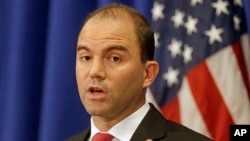President Barack Obama's administration says the killing of American journalist James Foley by militants from the Islamic State group amounts to a direct terrorist attack on the United States.
"We have seen them posing a threat to our interests in the region, to our personnel and facilities in the region, and clearly the brutal execution of Jim Foley represented an affront, an attack - not just on him, but he's an American - and we see that as an attack on our country, when one of our own is killed like that," said Deputy National Security Advisor, Ben Rhodes.
Rhodes said Friday the U.S. is ready to take additional action against Islamic State fighters -- to protect Americans, and because the group poses a much greater threat today than it did six months ago. In deciding on further airstrikes, Rhodes said, U.S. military activity will not be "restricted" by borders.
Islamic State fighters have gained control of a large swath of territory in northern Iraq and eastern Syria during the past six weeks, and they have moved freely between the two nations.
In a separate development Friday, a massive attack on a Sunni Muslim mosque northeast of Baghdad appeared to undermine the Shi'ite-led central government's effort to bridge Iraq's sectarian divides and forge a united front against Islamic State militants. Dozens of people were killed as they attended weekly prayers.
Witnesses and Sunni religious officials blamed members of a hardline Shi'ite militia for the attack, but some government military commanders said they suspect Islamic State militants were responsible for the carnage.
Strong reactions
A U.S. State Department spokeswoman, Marie Harf condemned the attack and said Iraqi leaders from across the political spectrum should help to unify the country against violent extremist groups.
U.S. Secretary of State John Kerry spoke by telephone Friday with Iraqi Foreign Minister Hoshyar Zebari about the situation in Iraq. The State Department said Kerry expressed his strong support for the formation of a new government and encouraged Zebari to press all parties on the need work together. The State Department said the two also agreed that Iraq, the U.S., the region and the international community must work together to face the threat posed by Islamic State militants.
Also Friday, Vice President Joe Biden called on Iraqis to overcome their differences and unite to fight the Islamic State. In an op-ed in The Washington Post, Biden said Iraq's survival depends on the ability of Iraqis to unite in a common effort. He said forming a government in Iraq is critical. Biden also praised the spirit of cooperation between security forces in Iraq, and said that Iraqi and Kurdish forces showed their ability to work together when they fought Islamic State militants at the Mosul dam.
U.N. Secretary-General Ban Ki-moon condemned "in the strongest terms" the mosque attack in Diyala province. He said all attacks on places of worship are completely unacceptable and are prohibited under international law. Mr. Ban called on leaders of all of Iraq's political factions to unite and urge their constituents to refrain from sectarianism.
US strikes
U.S. aircraft launched at least three airstrikes Friday against Islamic State positions near the Mosul dam in northern Iraq, a crucial source of power and water for more than a million people. Militant fighters gained control of the dam this month, but combined Iraqi and Kurdish forces have since counterattacked and forced the extremists to withdraw.
Since August 8, U.S. forces have carried out 93 airstrikes against Islamic State militants, about two-thirds of them near the Mosul dam. The chief U.S. military spokesman at the Pentagon, Rear Admiral John Kirby, declined to answer reporters' questions Friday about whether the air campaign against the Islamic State group will be extended into Syria.
"I'm not going to get ahead of planning that hasn't been done or decisions that haven't been made. We don't telegraph our punches," said Kirby.
Foley, a freelance photojournalist, was kidnapped in Syria in 2012. The Islamic State group has its headquarters in Syria, and that is where Foley is believed to have been beheaded. Rhodes said the U.S. did everything it could to free Foley and bring home other Americans held by terrorists, and he said a failed rescue attempt last month inside Syria was a "tragic" failure.
U.S. Defense Secretary Chuck Hagel says the Islamic State group is a terrorist threat "beyond anything we have seen." He describes the militants as better trained, armed, organized and financed than any other terrorist organization, including al-Qaida.





